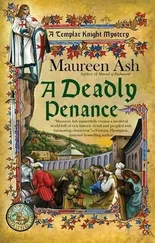Maureen Ash - Murder for Christ's Mass
Здесь есть возможность читать онлайн «Maureen Ash - Murder for Christ's Mass» весь текст электронной книги совершенно бесплатно (целиком полную версию без сокращений). В некоторых случаях можно слушать аудио, скачать через торрент в формате fb2 и присутствует краткое содержание. Жанр: Исторический детектив, на английском языке. Описание произведения, (предисловие) а так же отзывы посетителей доступны на портале библиотеки ЛибКат.
- Название:Murder for Christ's Mass
- Автор:
- Жанр:
- Год:неизвестен
- ISBN:нет данных
- Рейтинг книги:5 / 5. Голосов: 1
-
Избранное:Добавить в избранное
- Отзывы:
-
Ваша оценка:
- 100
- 1
- 2
- 3
- 4
- 5
Murder for Christ's Mass: краткое содержание, описание и аннотация
Предлагаем к чтению аннотацию, описание, краткое содержание или предисловие (зависит от того, что написал сам автор книги «Murder for Christ's Mass»). Если вы не нашли необходимую информацию о книге — напишите в комментариях, мы постараемся отыскать её.
Murder for Christ's Mass — читать онлайн бесплатно полную книгу (весь текст) целиком
Ниже представлен текст книги, разбитый по страницам. Система сохранения места последней прочитанной страницы, позволяет с удобством читать онлайн бесплатно книгу «Murder for Christ's Mass», без необходимости каждый раз заново искать на чём Вы остановились. Поставьте закладку, и сможете в любой момент перейти на страницу, на которой закончили чтение.
Интервал:
Закладка:
“I am, lord,” Bascot replied.
“Then do so, and with all haste. It is likely the cache is still at Canwick; it would be difficult to transport it elsewhere in complete secrecy. Nevertheless, once news of Cerlo’s suicide spreads, Legerton may fear the mason named his accomplice before he died and try to move the rest of the trove to a more secure hiding place. His manor house must be searched before he has a chance to do that.”
“Unless Legerton is gaming, he will be at Canwick, since the exchange is not open today,” Nicolaa said.
“Are you sure, Wife?” Camville asked her.
Nicolaa nodded. “He is not due into his office until tomorrow,” she said. “And, unlike de Stow, Legerton is not an industrious man. Even when he is abroad in Lincoln, he never goes into the exchange unless it is one of the scheduled opening days, insisting any who wish to see him make an appointment.”
“Then go to Canwick now, de Marins, before he is forewarned by the mason’s suicide. Take de Laxton with you and an escort of men-at-arms from the barracks. Search Legerton’s manor house and, if he is there, arrest him. If fortune is with us, you will find the trove.”
Thirty
As Bascot and the men of the escort left the bail, Walter Legerton was sitting on the dais in the hall of his manor house. He was in a foul temper and roundly cursed a servant who brought him a cup of wine for spilling some as it was placed on the table.
Morosely the exchanger surveyed the trappings of his hall-the exquisitely stitched tapestries on the walls, the fine pewter candlestick holders and the expensive silver cup out of which he was drinking-and realised that none of these acquisitions had made him a happy man. The manor house had cost far more to renovate than he had calculated and the wealth he had acquired from the sale of his father’s silver manufactory had been gone almost before he had time to count it. He should have listened to his sister when she cautioned him against buying it; Silvana had inherited their father’s canniness with money and her advice had been sound. He prayed she would never discover how deeply in debt he truly was, nor the means by which he had tried to recoup his losses.
His gaze wandered over the people gathered in the hall. All the guests he had entertained at the season of Christ’s Mass had gone home, thank God, but there was still a sizeable number of servants in attendance, far more than necessary for a manor house the size of this one. He would be forced to dismiss many of them if his schemes came to naught.
He saw Simon Partager enter the hall, a sheaf of documents in his hand, and the sour bile of anger rose in his throat. Yesterday the assayer had come to him and given notice of his intent to leave Legerton’s employ, saying he had been offered a position as assayer in a silver mine in the far north of England and had accepted it. Since the salary for the new post would be far less than Simon earned at the exchange, Legerton supposed his affair with Iseult might have influenced the assayer’s decision to leave Lincoln. If so, the resentment was misplaced. If he had not bedded the beautiful, but empty-headed, wife of his assayer, she would not have been slow to find another paramour. She was as lascivious as she was greedy, and would bed any man who took her fancy, especially if a prospective lover promised to shower her with gifts. Partager would be hard pressed to keep Iseult satisfied on the pittance he would receive at the mine. Walter had no doubt she would soon find a new lover wherever her husband took her, even if it was to the desolation of the Northumbria moors.
His recollection of the incident prompted him to remember another event of the previous day, when Helias de Stow had come to his office to discuss the arrest of Tasser. De Stow was full of worry about the money he, at Legerton’s urging, had borrowed from the silversmith, fearing his indebtedness would be revealed during the course of the sheriff’s investigation into the recent murders. If it became known that he had dealings with such an unscrupulous man as Tasser, Helias said fearfully, he would be in jeopardy of losing his post, since it would not be considered appropriate for a man who had charge of money belonging to the king’s treasury to have traffic with a person of such ill repute. Legerton forced from his mind the guilty knowledge that de Stow would not have needed to borrow money if he had been given the funds the Exchange in London had sent to cover the cost of replacing equipment in the mint. He had not really meant to appropriate it, only borrow it for a few days, but he had lost it all in one night at the gaming tables and did not have the funds to replace it.
Legerton had tried to reassure de Stow, telling the moneyer it was unlikely his indebtedness to Tasser would be revealed, but he had done it halfheartedly. De Stow’s concerns seemed small in comparison with his own.
The exchanger banged his cup on the table as a signal for it to be refilled. As a manservant hurried forward with a jug of wine, Partager approached the dais, the parcel of papers still clutched in his hand and a look of self-righteous determination on his face. Legerton groaned. Was he about to be given more distressing news?
Iseult Partager also watched her husband advance up the hall with a flicker of unease. Simon had told her earlier that day to pack up her clothing and any other possessions she wished to take with her and be ready to leave for Northumbria in the morning. Iseult had made a determined protest, but it had fallen on deaf ears. Simon had been adamant they were leaving; she had even tried to detract him from his plan with a bold invitation to lovemaking, but he had roughly thrust her aside, saying he had no time for such games. Never before had she seen Simon in such an inflexible mood, and it frightened her.
Although her husband had not mentioned Legerton’s name, she thought it must be something to do with the exchanger that was at the root of Simon’s purpose in leaving. Since he had never given any sign that he knew of her liaison with his employer, she doubted it could be that, but something he said had struck a chord of disquietude within her. It had been when he was telling her to pack up her clothing and had noticed, laying on a table in their chamber, the tawdry cloak clasp that Legerton had given her on the first day of the New Year.
Picking the brooch up, Simon had thrown it on the floor and ground it under the heel of his boot, saying Legerton would have been better advised to have kept the money he spent on the gift in his scrip for, when it became known he fraternized with people of unsavoury reputation, he would lose his post and need every penny he could find.
Iseult was not sure what he meant, but she knew Legerton loved to gamble and often lost money at the gaming tables. Simon was the exchanger’s clerk as well as his assayer and therefore privy to Legerton’s personal accounts. Had her lover become indebted to men of bad character, ones who had no qualms about making his losses publically known, thereby damaging his reputation so badly the officials in London would deem him untrustworthy? Or was it something to do with Tasser, the silversmith who had been arrested and, it was said, would soon be charged with murdering his apprentice? Surely Legerton could not be involved in that affair? Or could he?
Silvana, too, was in a state of worry. As she shepherded her two young nephews-boys of eight and ten years-into the hall to take their seats for the evening meal, she looked to where her brother sat and saw the deep worry lines creasing his face. Even though he thought her unaware of his penchant for games of chance, she knew of it, and that he sadly lacked the skill to win. He had always been impulsive and far too optimistic for his own good. She loved him dearly, but her affection did not make her blind to his faults. Recently she had come to suspect he was in far deeper debt than he admitted and had taken drastic measures to try to remedy the situation, such as borrowing money to stake at the gaming tables in a desperate bid to recoup his losses. If this was what he had done, and it became known, it was more than likely he would be dismissed from his post. If that happened, Walter would be forced to sell the manor house and buy a home of much humbler proportions; perhaps even go to work for an employer in a gold or silver manufactory.
Читать дальшеИнтервал:
Закладка:
Похожие книги на «Murder for Christ's Mass»
Представляем Вашему вниманию похожие книги на «Murder for Christ's Mass» списком для выбора. Мы отобрали схожую по названию и смыслу литературу в надежде предоставить читателям больше вариантов отыскать новые, интересные, ещё непрочитанные произведения.
Обсуждение, отзывы о книге «Murder for Christ's Mass» и просто собственные мнения читателей. Оставьте ваши комментарии, напишите, что Вы думаете о произведении, его смысле или главных героях. Укажите что конкретно понравилось, а что нет, и почему Вы так считаете.












